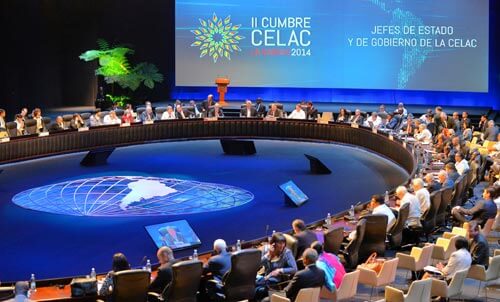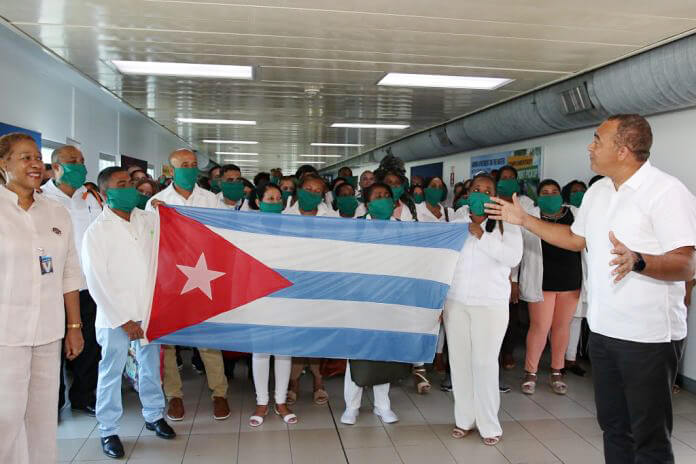HAVANA (AP) — Leaders from across Latin America and the Caribbean signed a resolution declaring the region a “zone of peace” Wednesday, pledging to resolve their disputes as respectful neighbors without the use of arms.
The joint declaration came on the final day of a summit of Western Hemisphere nations minus the United States and Canada. The grouping, conceived as a vehicle for regional integration independent of Washington’s influence, was born in 2011.
The 33 nations gathered in Havana committed to nonintervention in each other’s internal affairs, to cultivate cooperation and friendship and to respect “the inalienable right of every state to choose its political, economic, social and cultural system,” Cuban President Raul Castro said, reading from the text of the resolution.
The language was an apparent allusion to Havana’s longtime exclusion from the Organization of American States due to its one-party Communist system, installed shortly after the 1959 Cuban Revolution. Cuba was suspended from the OAS in 1962, and the Community of Latin American and Caribbean States, or CELAC, was created as an alternative.
Leaders have called the summit an attempt to seek unity amid diversity — both of which were evident in their remarks Wednesday.
Heads of state gave speeches highlighting the need to solve urgent problems such as regional insecurity and economic struggles, and backing Argentine sovereignty over the British-controlled Falkland Islands, known in the Spanish-speaking world as the Malvinas.
Some left-leaning presidents railed against U.S. domination of world lending organizations, cultural imperialism, consumerism and “savage capitalism.”
Conservative Colombian President Juan Manuel Santos, however, spoke of free trade’s potential to spur economic growth. Uruguay’s famously casual Jose Mujica delivered an impassioned denunciation of the business suit, one of the light moments of an otherwise sober gathering.
“We are sure that by sharing experience between the nations of Latin America and the Caribbean, we will be able to enrich public policy in every one of our nations,” said outgoing Chilean President Sebastian Pinera, who sat next to his elected successor and political rival, Michelle Bachelet.
Pinera and President Ollanta Humala of Peru made a joint appearance to publicly put behind them their nations’ longtime maritime border dispute. On Monday, the United Nations’ highest court drew a sea boundary granting Peru a bigger slice of the Pacific Ocean while keeping rich coastal fishing grounds under Chilean control.
There were also signs of simmering disputes.
Dominican President Danilo Medina bristled at suggestions his nation treats migrants unfairly following a court ruling that could render stateless thousands of people born in the country — many of them poor descendants of Haitian migrants.
“They want to accuse us of being racists and violating human rights,” Medina said. “It’s not true that the Dominican Republic strips nationality from anyone. I can’t take away from anyone what they didn’t already have.”
As the summit closed in the early evening, Cuba handed off the rotating presidency of CELAC to Costa Rica, which will host the next summit.
President Laura Chinchilla said Costa Rica’s stewardship of the bloc would be guided by “the values and objectives that unite us … and are grounded in our rich historic heritage, particularly respect for human rights and rule of law in their national and international dimensions as a basis for harmonious coexistence.”
The Central American nation’s ambassador to Cuba met for about a half-hour Wednesday morning with two independent human rights activists to hear their concerns.
“We asked that under the pro-tempore presidency of Costa Rica, Cuba be encouraged to begin a process of gradual reforms on the issue of human rights,” Elizardo Sanchez, head of the non-governmental Cuban Commission for Human Rights and National Reconciliation, said after he and his group’s communications director met with the envoy.
On Tuesday, U.N. Secretary-General Ban Ki-moon said he had spoken to Cuban leadership and pressed them on human rights, free expression and freedom of assembly.
Cuba considers its small community of outspoken government opponents to be treasonous “mercenaries” bent on undermining the island’s political system at the behest of foreign interests. Dissidents have reported increased detentions and harassment during the summit.
Associated Press writer Anne-Marie Garcia contributed to this report.


























